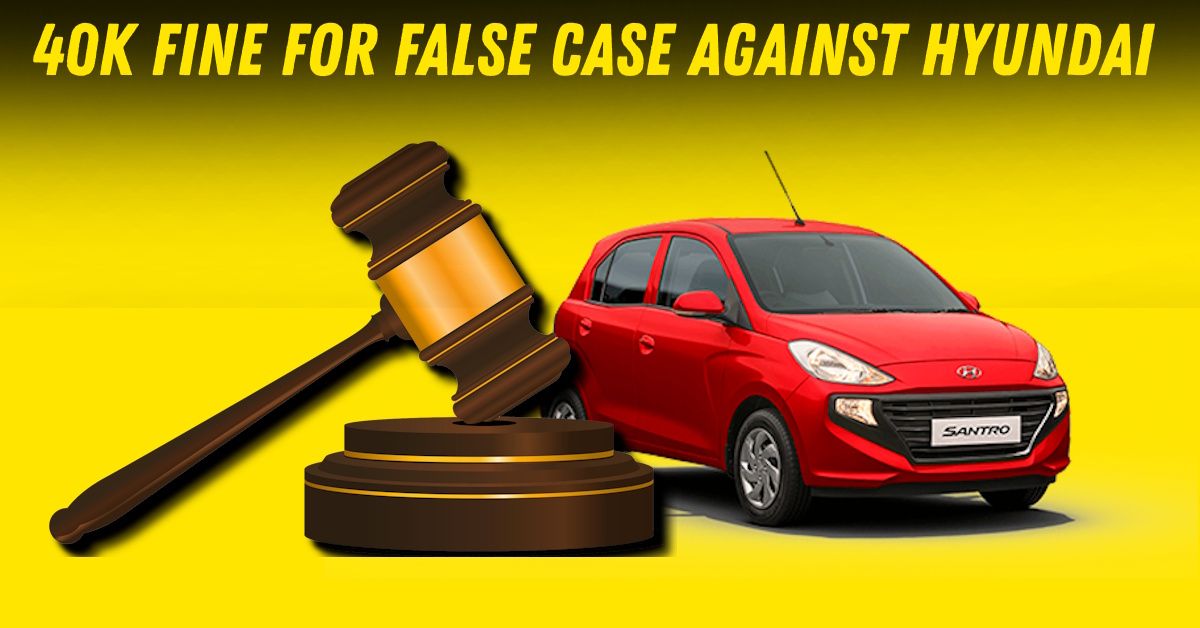Consumer Court Fines Santro Owner ₹40,000 For Filing Misleading Case Against Hyundai


In a noteworthy decision passed on May 27, 2025, the Bengaluru Urban District Consumer Disputes Redressal Commission (DCDRC) imposed ₹40,000 in legal costs on a complainant who filed a consumer complaint against Hyundai Motors India and related parties, despite having sold the damaged vehicle and already secured insurance compensation.
The incident in question dates back to October 2024, when the complainant’s vehicle, purchased for ₹5.22 lakh with an additional ₹14,880 extended warranty, allegedly suffered a sudden brake failure. After bringing the car to a halt, the bonnet reportedly caught fire. Despite the owner turning off the engine and engaging the handbrake, flames engulfed the engine compartment. The extent of damage was later estimated at approximately ₹6.7 lakh.
An insurance assessor attributed the blaze to a mechanical failure. The man, asserting that his extended warranty should cover such a scenario, proceeded to file a complaint against Hyundai, its dealer, and its roadside assistance service, seeking repair, replacement, or compensation.
However, the commission discovered that the complainant had sold the damaged vehicle to Trigent Corporate in January 2025 for ₹88,000. He had also received an insurance payout of ₹3 lakh to cover the loss. The complainant failed to disclose both of these key facts in his petition to the consumer forum.
The bench, headed by President (in-charge) Anita Shivakumar and Member Suma Anil Kumar, highlighted that after the sale of a movable asset, the seller loses all rights associated with it. This legal principle, they noted, was clearly applicable to the present case.
The commission criticised the petitioner and his legal counsel for deliberately concealing the sale and insurance settlement. The bench deemed this act as a mala fide intention to misuse judicial resources. It explicitly stated:
“They are well aware that the car in question is not in their possession to replace or to repair the vehicle. Such being the case, complainant filed this complaint with mala fide intention and going to waste the precious time of the court…”
As a result, the forum ruled the complaint inadmissible and ordered the imposition of ₹40,000 in legal costs. These costs are to be remitted to the Consumer Welfare Fund within 30 days or else will accrue interest at 10 percent per annum.
Consumer protection laws aim to safeguard the rights of purchasers against defects and unfair trade practices. Yet, this case demonstrates how the legal system also upholds accountability and transparency from the complainant's side. Once the vehicle was sold, the petitioner no longer had the right to demand repair or replacement. His act of suppressing the insurance payout further raised doubts about the legitimacy of his intentions.
The bench underlined that a fair decision requires full disclosure. Had the petitioner been transparent, the forum could have considered the circumstances more holistically. Instead, it viewed the petition as an abuse of process that wasted the court’s time.
This verdict sends a strong message to consumers and their legal advisors: honesty and disclosure are critical in legal proceedings. Concealing facts not only weakens the case but also invites penalties.
The judgment also opens up broader questions. Can a person still claim compensation or warranty support after selling a defective product, especially if the defect caused significant damage? In many legal interpretations, continued ownership is essential for asserting such rights. This case confirms that selling the asset severs the legal link required for a valid claim.
By dismissing the petition and imposing ₹40,000 in costs, the DCDRC reinforced its stand against misuse of consumer forums. The ruling makes it clear that legal redressal must be grounded in transparency, ownership, and accountability. It also places a responsibility on legal professionals to verify the completeness and truthfulness of the facts presented by their clients.
Consumer courts exist to ensure justice, but this case is a reminder that the system must not be taken for granted. A credible claim starts with an honest account. Without that, even legitimate grievances can collapse under scrutiny.
Via LawChakra